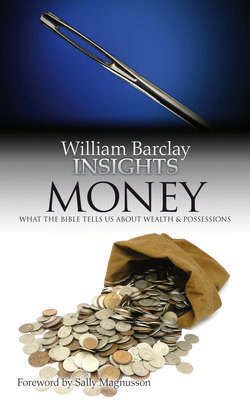Читать книгу Insights: Money - William Barclay - Страница 9
На сайте Литреса книга снята с продажи.
ОглавлениеThe end of the world’s values
Luke 6:20–6
Jesus lifted up his eyes upon his disciples and said, ‘Happy are you poor, because yours is the kingdom of God. Happy are you who are hungry now because you will be filled. Happy are you who weep now because you will laugh. Happy are you when men will hate you and shut you off from their company and insult you and cast out your name as an evil name, for the sake of the Son of Man; for – look you – your reward in heaven will be great. Their fathers used to treat the prophets in the same way. But woe to you who are rich because you have all the comfort you are going to get. Woe to you who are filled because you will be hungry. Woe to you who laugh now because you will grieve and weep. Woe to you when all men speak well of you, for that is what your fathers used to do to the false prophets.’
LUKE’s Sermon on the Plain and Matthew’s Sermon on the Mount (Matthew, chapters 5–7) closely correspond. Both start with a series of beatitudes. There are differences between the versions of Matthew and Luke, but this one thing is clear – they are a series of bombshells. It may well be that we have read them so often that we have forgotten how revolutionary they are. They are quite unlike the laws which a philosopher or a typical wise man might lay down. Each one is a challenge.
As the scholar Adolf Deissmann said, ‘They are spoken in an electric atmosphere. They are not quiet stars but flashes of lightning followed by a thunder of surprise and amazement.’ They take the accepted standards and turn them upside down. The people whom Jesus called happy the world would call wretched; and the people Jesus called wretched the world would call happy. Just imagine anyone saying, ‘Happy are the poor, and, Woe to the rich!’ To talk like that is to put an end to the world’s values altogether.
Where then is the key to this? It comes in verse 24. There Jesus says, ‘Woe to you who are rich because you have all the comfort you are going to get.’ The word Jesus uses for have is the word used for receiving payment in full of an account. What Jesus is saying is this, ‘If you set your heart and bend your whole energies to obtain the things which the world values, you will get them – but that is all you will ever get.’ In the expressive phrase, literally, you have had it! But if on the other hand you set your heart and bend all your energies to be utterly loyal to God and true to Christ, you will run into all kinds of trouble; you may by the world’s standards look unhappy, but much of your payment is still to come; and it will be joy eternal.
We are here face to face with an eternal choice which begins in childhood and never ends till life ends. Will you take the easy way which yields immediate pleasure and profit? or, Will you take the hard way which yields immediate toil and sometimes suffering? Will you seize on the pleasure and the profit of the moment? or, Are you willing to look ahead and sacrifice them for the greater good? Will you concentrate on the world’s rewards? or, Will you concentrate on Christ? If you take the world’s way, you must abandon the values of Christ. If you take Christ’s way, you must abandon the values of the world.
Jesus had no doubt which way in the end brought happiness. It has been said that Jesus promised his disciples three things – that they would be completely fearless, absurdly happy and in constant trouble. G. K. Chesterton, whose principles constantly got him into trouble, once said, ‘I like getting into hot water. It keeps you clean!’ It is Jesus’ teaching that the joy of heaven will amply compensate for the trouble of earth. As Paul said, ‘This slight momentary affliction is preparing us for an eternal weight of glory beyond all measure’ (2 Corinthians 4:17). The challenge of the beatitudes is, ‘Will you be happy in the world’s way, or in Christ’s way?’
